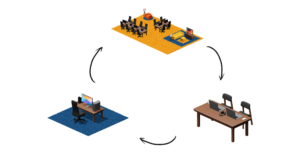Thinking about what the future of work looks like? The founder of Worksimply, Jaime Aoyagi, is your guy.
It goes without saying that the future has changed forever and remote work is here to stay. But what most employers may not realize is that the workplace of tomorrow isn’t just confined to an at-home office or central downtown location.
Aoyagi predicts that the future of work will take place in three main spaces: an at-home office, a central headquarters that’s typically located in a downtown core and an on-demand workspace that’s less than a 10-minute commute from the employee’s home.
Catching a new wave of opportunity and recognizing the transformational shift taking place in office settings, Aoyagi decided to grow Worksimply – a workplace platform – by doubling down in a new market to serve more customers.
We sat down with Aoyagi to learn more about Worksimply, and how he was able to shift markets by thinking bigger.
First, can you tell us more about what exactly is Worksimply?
“Worksimply’s solution is two-fold. For hybrid companies, we offer a workplace platform that makes office space more affordable and increases employees’ freedom. For co-working space operators, we offer software to manage end-to-end guest bookings for co-working spaces.
To put it into perspective, we help small businesses manage their own hybrid workforce by allowing their employees to book desks at their HQ and at co-working spaces all across North America,” said Aoyagi.

What do you think is unique about Worksimply’s value proposition?
“Fostering an engaging work culture is crucial to creating a well-oiled, productive and happy team. At Worksimply, we understand how challenging this has been for remote and hybrid teams and are working to help them better manage their remote culture.
While a lot of companies today are working in a predominantly remote environment, we know that face-to-face interaction is still important. We know that it’s not about a desk, it’s about collaborating with your teammates.
This is exactly why we’ve rolled out features that allow teams to encourage their staff to meet in-person by allowing them to see who is working from where and when. But we didn’t stop there, we also offer services that help employers go above and beyond when it comes to maintaining a great office culture for remote employees – like providing snacks, drinks and workshops.”
This pandemic had a major impact on how Canadians work and use office space. How does Worksimply help companies in today’s current climate of needing flexible hybrid office space?
“The pandemic completely changed the way the world works. Pre-pandemic, the standard was for companies to have one designated desk per employee. Fast forward to today, a lot of companies have gone fully remote while others have embraced a hybrid model.
Now this presents a unique situation. A hybrid model can look very different from company to company, but nonetheless, the office will still play a huge role in how people work.
Moving forward, I think work will take place in three main areas: the home, the central office and finally flexible office spaces close to home,” explained Aoyagi.
This is exactly where Worksimply comes in. Worksimply is helping SMEs not only manage but also support their hybrid workforce by allowing their employees to book office space close to their home or their central office.
Jaime, you saw a new opportunity in the market and decided to double down on it to grow your business. What led you in making this decision?
“The pandemic obviously played a large role in why we decided to double down in a new market. We knew that companies would need on-demand workspace to accommodate their staff with flexible options,” Aoyagi explained.
Thinking 10 steps ahead, Jaime realized that there was a perfect opportunity for him to extend his customer base. “Since we already had space operators and co-working spaces on the Worksimply platform, we quickly recognized we’d be able to serve a new market – SMEs – that would need access to the space operators we were already serving flexible on-demand bookings.
“We sell software-as-a-service to space operators, and today our demand is twofold – on one hand, it’s businesses looking to book space for their employees, and on the other, it’s workspace operators looking for easy-to-use software they can integrate into their operations.”

Groundbreaking ideas are hardly ever lightbulb moments, but rather the result of developing and improving over time. After you made the decision to build in a new direction, what did the process look like?
“Once we realized the toll the pandemic was beginning to take on the world’s workforce and the new wave of opportunity it was creating, we started developing the software for space operators to implement.
As more and more space operators began to use our services, we were simultaneously creating a supply for hybrid-working organizations to choose flexible office space,” explained Aoyagi.
How did the DMZ support you throughout the process?
“Throughout the process, I was able to lean on the DMZ for mentorship and guidance.
As questions came up, I was able to turn to my Program Lead, Mohi Sanisel, who was able to help me navigate through the different challenges that presented themselves.
The DMZ was also able to introduce Worksimply to our first customer leveraging their new model.”
What would you say to other startup founders who are looking to iterate on their core strategy?
“Put your product out there as soon as possible and put your assumptions to test.”






/https://www.thestar.com/content/dam/thestar/business/2022/05/05/neo-financial-becomes-calgarys-latest-1-billion-tech-unicorn/20220504130528-d42ac644beebbf9b9e256a5a48d580b1082506a32e3562812df6dac334c6d2b7.jpg)
:format(jpeg)/cloudfront-us-east-1.images.arcpublishing.com/tgam/2X5HWYITLFE77LMCE3FSJ37SCE.jpg)